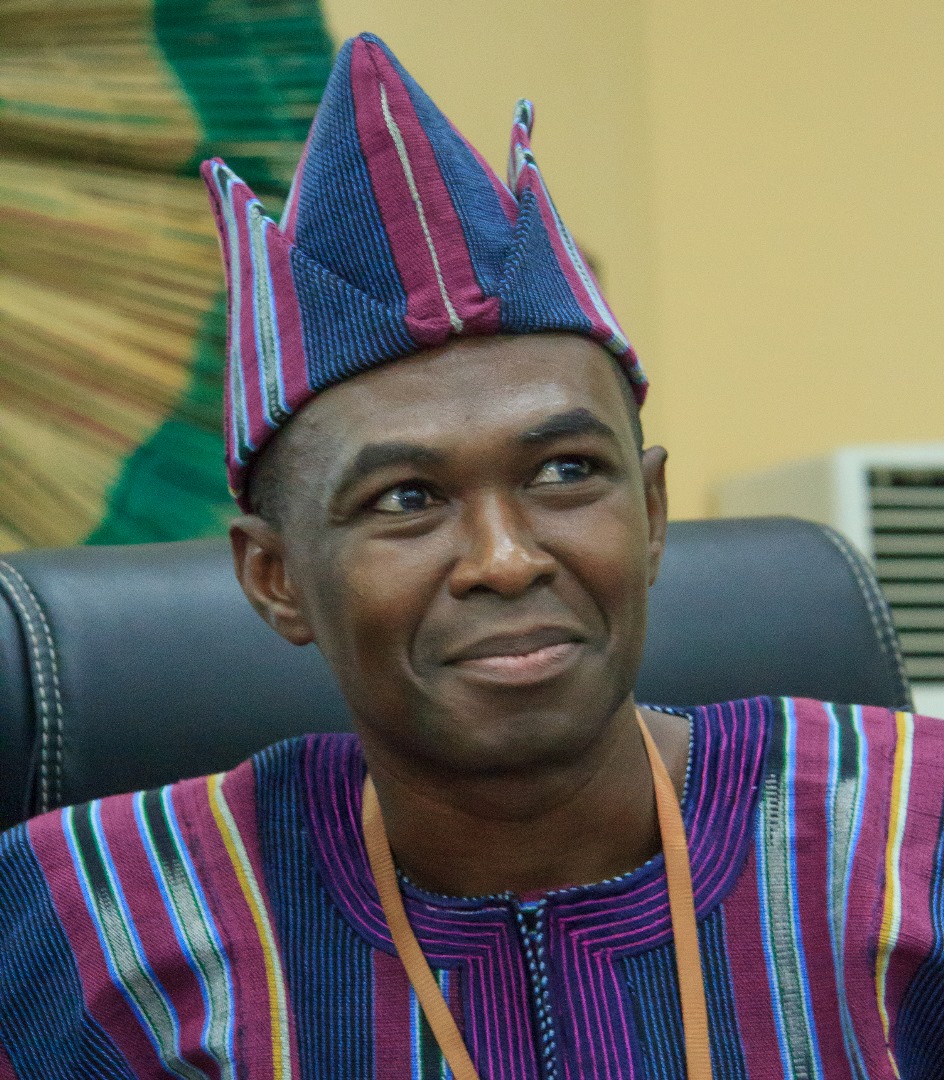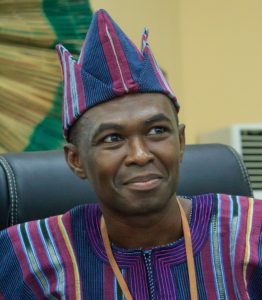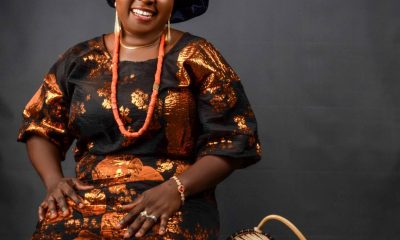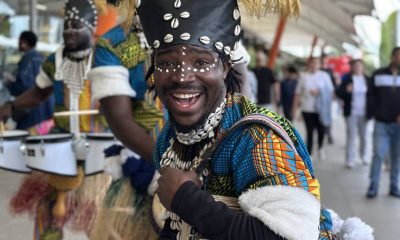society
The Great Ifẹ̀ Empire and Its Legacy: A Blueprint for Mending Our Broken World- Akin Ogundiran

The Great Ifẹ̀ Empire and Its Legacy: A Blueprint for Mending Our Broken World- Akin Ogundiran
Excerpts of the Keynote Address Presented at the Opening of the International Conference, “Ile-Ife and Yoruba Civilisation: The Nexus between Tradition and Modernity,” at Ojaja Arena, Ile-Ife, October 10, 2023
I pay homage to His Imperial Majesty, Ọ̀ọ̀ni Adéyẹyè Ẹniìtàn Babatúndé Ògúnwùsì, Ọ̀jájá II. I salute government representatives, all the Ọba, Olori, Chieftains, Princes and Princesses, Vice Chancellors, University Administrators, Fellow Scholars, and Conferees—distinguished Ladies and Gentlemen. I am honored to join you this morning. I commend the Imperial Majesty for his vision and generous support for this conference on Yoruba history. My commendation also goes to the conference conveners led by eminent historian Professor Siyan.
In the next three days, the conferees will explore different aspects of Ife history, ancient, recent, and contemporary. They will do so from several disciplinary angles. A multigenerational cast of speakers will showcase their recent discoveries from archaeology to archives, oral tradition to rituals. My contribution this morning focuses on answering the following questions: How can we use the past to guide our present? How can the true knowledge of our history, unmitigated by politics and ideology, set us free from the bondage of ignorance that has broken our world?
Distinguished ladies and gentlemen, I chose “The Great Ifẹ̀ Empire and Its Legacy: A Blueprint for Mending Our Broken World” as the title of my keynote address because of my sincere belief that history has a purpose. In our clime, the ultimate purpose of historical study is to uplift our spirit, explain how we got here, and use historical knowledge to restore and repair our broken selves. Like many of you at this conference, I am committed to studying history so I can use the knowledge of the past to create a new mirror that we can use to look at ourselves. Those who use other people’s mirrors to look at themselves are bound to see distorted images of themselves. The mirrors we create must give us a balanced view of who we are as a people and account for the brilliance and shortcomings that make us human.
The Yoruba believe that Ile-Ife is the origin of their civilization. A century of historical and archaeological research has confirmed this. It also shows that the origin of the civilization is different from the origin of the deep-time Yoruba-speaking people. Those ultimate Yoruba ancestors (proto-Yoruboid) originated from the western part of the Niger-Benue Confluence in the present-day Okun-Yoruba area as early as 2,500 BC. This research has also given us insights into how Ile-Ife spearheaded a revolution about 1000 AD that gave birth to the present-day Yoruba cultural identity. The name, Ile-Ife, hints at how special this city was over the past 1,000 years.
Contrary to the oft-repeated folk etymology, Ile-Ife does not mean “House of Love.” Rather, it means “House of Abundance” and “House of Expansion.” The ancient city also has several aliases, such as “City of Daybreak,” City of Sunrise,” and “The Source.” These names and monikers illustrate the Yoruba belief that Ile-Ife is the ground zero of humanity. It is the place where the earth and humanity were created. The Yoruba ancestors knew that what makes us human is not biology. It is culture and consciousness. So, these labels refer to Ile-Ife as the birthplace of classical Yoruba civilization as we know it.
Historical records show that Ile-Ife occupies a special place in African history. When Ibn Battuta, the Berber-Moroccan traveler, visited the Mali Empire in 1352-53, he was told about Ile-Ife as one of the biggest kingdoms in Africa and its king (the Ọ̀ọ̀ni) as one of the greatest kings in the Land of the Black People (Sudan). Duarte Pereira Pacheco, the Portuguese explorer and soldier, was informed in the court of the King of Benin in 1475 that the King of Ile-Ife was the mighty lord of the region, and the explorer likened the status of the Ọ̀ọ̀ni (Oghoni/Owoni) among the Blacks as similar to that of the Pope among the Europeans. The people of Oyo (Old Oyo) told Richard Landers in 1830 that it was in Ile-Ife where their first parents were created and from where all Africa was peopled. The Yoruba people that Leo Frobenius (German scholar) met in Timbuktu (Mali) in 1909 told him that their forebears originated from Ile-Ife and turned into stones which are to be found in Ile-Ife.
The accomplishments of Ile-Ife in arts, science, technology, commerce, statecraft, religion, and philosophy are the reasons for this fame. Based on archaeological research that several scholars and I have done in Ile-Ife and other parts of Yorubaland, we now know that Ile-Ife is the oldest continuously occupied city in West Africa. Its leaders developed one of the oldest urban planning systems in West African history.
Ile-Ife was one of Africa’s most powerful economic engines during its heyday, 700 to 1000 years ago. The city was famous for glass, iron, and steel production, and its products were sold as far as Ghana and Mali Empires during the eleventh through fourteenth centuries. The material scientists of Ile-Ife invented a unique glass technology, and the city’s political leaders and merchants used this technology to create a glass-bead currency system that integrated the economy of many parts of West Africa, from Igbo-Ukwu in present-day Nigeria to Walata in Mauretania. This is a feat that the Economic Community of West African States (ECOWAS) has yet to accomplish. Through its glass industry, Ile-Ife was a pacesetter in African history on the principle of technological independence. By 1200 AD, the political entrepreneurs of Ile-Ife had converted their vast networks of colonies, trading stations, and client states into the first empire in Yorubaland. It is also the first empire in all parts of Africa that lie south of the River Niger, from Lokoja (Nigeria) to Cape Town (South Africa).
Ancient Ile-Ife was also a centre of learning in all branches of science and arts, including philosophy, material chemistry, Ifa divination, and astronomy. This Yoruba city was a contemporary of other intellectual cities in the world, such as Oxford and Cambridge in the United Kingdom and Timbuktu in present-day Mali. As a centre of education, research, knowledge, pilgrimage, and high art, Ile-Ife was a tourist center, attracting visitors across West Africa.
Unfortunately, the above stories are not taught in Nigerian schools, from nursery to the university. There is hardly a home in Nigeria that is aware of these accomplishments. Even some of our elders and traditional rulers who should know better often mislead us with wrong stories that cater to their ego rather than scientific, historical information. This lack of knowledge about our past is a symptom of our broken world. It is a world beset with little regard for knowledge and innovation and the discipline that goes with it. No respect for human dignity and life. I’m talking of a world where the gaps between political leadership and common people widen daily. In this broken world, there is a lack of confidence and appreciation for African indigenous culture and history, and the priority of the general population is the consumption of imported goods over locally produced goods.
We can’t blame the poorly educated and ill-informed citizens for thinking their ancestors accomplished nothing and that their salvation lies outside the shores of their country, in the hands of those who look different from them. This conference must energize us to re-educate the youth and the old so they can become conscious of the depth and richness of African history. With that consciousness, we will understand that Ile-Ife anticipated and accomplished many aspects of modernity that we often erroneously attribute to the Europeans. In ancient Ile-Ife, respect for human dignity, including people with disabilities, was promoted as the foundational ethos of civilization. In Ile-Ife, it was required that citizens must be educated and become knowledgeable in history, philosophy, arts, and crafts. The Ife ancestors also developed indirect democracy, a system that curtailed and, for the most part, prevented autocracy. They reminded us that you cannot have a true democracy where there is scarcity, hunger, and insecurity. To this end, the philosophers and economic planners of classical Ile-Ife developed an economic theory that was based on the principle of abundance. This is opposed to the principle of scarcity that drives Western economic theories today.
To begin to mend our broken world, our political leaders, educators, teachers, and university administrators must be deliberate and strategic in integrating the accomplishments of the Ife Empire into the history curriculum, noting that these accomplishments are the pride of all Africans, not the Yoruba people alone.
This conference is the beginning of a long conversation and action plan that must be put in place. It cannot achieve everything our royal father and conveners have outlined as the rationale for this three-day gathering. There is so much we still do not know about the history of Ile-Ife and the Yoruba. Therefore, we must continue searching and studying. To convert our talk into action that will yield long-lasting desired results, I urge Ọ̀ọ̀ni Ogunwusi to use his vast social networks and influence to coordinate the setting up of a 100 Billion Naira Global Endowment Fund for Yoruba Historical and Cultural Research. The priority is to use the fund to create a Center for the Advancement of Yoruba Studies that will coordinate such research endeavors, build a top-notch ultra-modern Museum and Library of Yoruba Civilization in Ile-Ife, and provide year-to-year research grants and fellowships for the study of Yoruba archaeology and history.
Every Oba in Yorubaland must also take up the challenge to work towards establishing a Museum of History and Culture in their respective towns and cities. They should rally their sons and daughters at home and abroad to fund and establish these museums. This proposition is not an assignment for the federal, state, or local government. It must be solely a community effort. When you visit any European town or village, they will take you first to their museums. Sometimes, a European town of 5,000 people will have ten museums that tell different aspects of the town’s history. Yoruba towns and cities have as deep a history as those European towns if we can learn to tell our stories with imagination and historical evidence. This is a task we must pursue. We owe it as a duty to our ancestors and the unborn generations. Thank you.
Akin Ogundiran is a Professor of History and Cardiss Collins Professor of Arts and Sciences at Northwestern University (Evanston, USA), President-Elect of the Society of Africanist Archaeologists, and a Member of the Nigerian Academy of Letters. He is the author of The Yoruba: A New History (2020).
news
Journalists for Good Governance Shines Searchlight on Local Government Administration

Journalists for Good Governance Shines Searchlight on Local Government Administration
…Calls for Accountability in Nigeria’s Grassroots Governance
LAGOS, Nigeria — A civil society coalition known as Journalists for Good Governance(JGG) has intensified public debate on transparency and accountability within Nigeria’s local government system, urging media professionals, civil society actors, and citizens to hold grassroots leaders accountable.
Speaking an event in Lagos recently, the acting chairman of the society, Comrade Bunmi Obarotimi said that despite reforms such as the Supreme Court’s 2024 ruling granting financial autonomy to all 774 Local Government Areas (LGAs), systemic challenges continues to hinder effective service delivery and responsible stewardship of public funds.
“Local governments are the closest tier of government to the people — yet too often they remain the least transparent. Without civic oversight and vibrant media, promises of autonomy ring hollow.” the acting chairman said.
The Journalist for Good Governance emphasised crucial roles that journalists can play in uncovering discrepancies in council spending, flagging poor service delivery, and educating citizens on their rights. Their call comes amid wider efforts by media and civic organisations to bridge accountability gaps. The civil society initiatives had previously launched monitoring campaigns to track local government expenditures and have been quietly advocating for transparency in how public money is deployed.
The leaders of the Journalists for Good Governance (JGG) highlighted the importance of physical assessment and citizens engagement on projects to boost people’s confidence, urging local councils to adopt open data platforms and proactive information dissemination in compliance with the Freedom of Information Act. Experts say the majority of LGAs currently lack operational websites or digital portals, further limiting public scrutiny.
The Journalists for Good Governance initiative aligns with sustained advocacy by civil society groups and governance experts calling for a collective approach to strengthening democratic accountability, and has decided to engage in critical and holistic assessments of how Local Governments is being run and the impact and quality of projects they embark-on and to address deficits in transparency and public trust.
Meanwhile, some state governments have signalled support for improved community engagement. In Lagos State, authorities reiterated a commitment to enhancing community media platforms as vehicles for civic participation and accountability at the grassroots level.
The renewed spotlight on local government administration has reignited public debate over fiscal responsibility and priorities. Controversies such as the widely criticised Adamawa council chairmen’s wives trip to Istanbul — which drew public outrage for perceived misuse of public funds — underscore why watchdog groups say stronger oversight mechanisms are urgently needed at the grassroots.
Citizens and activists have welcomed the journalists’ initiative, calling for sustained media engagement that goes beyond headlines to influence policy and accountability reform.
The civic rights advocates note that real change will require robust legal frameworks, a free press, and empowered communities equipped to demand transparency at every level of governance.
As Journalists for Good Governance mobilises its members, the coming months are likely to see heightened media attention on grassroots administration — from council budgets and service delivery to the enforcement of public information laws and digital transparency initiatives.
society
Good Politics Or Just Power? Two Years After The Elections

Good Politics Or Just Power? Two Years After The Elections
Two years after the last general election, Nigerians are justified in asking a direct question: is our democracy stronger today than it was then? Democracy is not measured by how many offices a party controls or how loudly politicians speak. It is measured by integrity, accountability, and the lived experience of the people. Good Politics demands more than victory at the polls; it demands moral leadership and visible progress in the lives of citizens.
The debate over amendments to the Electoral Act should have provided an opportunity to deepen transparency and strengthen public confidence. Instead, hesitation to fully embrace reforms that safeguard credible vote transmission and accountability has fueled doubt. In a nation where electoral credibility remains fragile, any reluctance to reinforce safeguards sends the wrong signal. Good Politics stands firmly for processes that are open, fair, and beyond suspicion.
The party in power commands significant authority across the federation. With control of the presidency, many state governments, a strong presence in the National Assembly, and influence at local levels, there should be no anxiety about reforms that ensure free and fair elections. Confidence in leadership is demonstrated not by dominance, but by a willingness to subject power to scrutiny. Politics rooted in the omoluabi ethos embraces fairness, transparency, and responsibility, even when inconvenient.
This is the standard long associated with Awolowo, whose politics emphasized discipline, social welfare, education, and institutional strength. His vision was not merely about holding office, but about transforming society through principled governance. Good Politics follows that tradition. It rejects manipulation, arrogance, and the concentration of power without accountability. It insists that authority must serve the people, not itself.
Beyond electoral reforms, democracy must deliver tangible relief. Across the country, households struggle with rising prices and shrinking purchasing power. Small businesses are burdened by escalating costs. Young people search for opportunities that remain scarce. When economic hardship deepens, democracy feels abstract. Good Politics recognizes that political legitimacy is reinforced when citizens can see and feel the benefits of governance.
The concentration of power within a single political structure should translate into coordinated reform and measurable development. When it does not, questions naturally arise. Democracy weakens when dominance replaces performance. It weakens when loyalty to party eclipses loyalty to principle. The omoluabi tradition teaches that character defines leadership. Without character, authority becomes hollow.
A healthy democracy requires credible elections and compassionate governance. It requires leaders who understand that politics is a moral enterprise. Two years into this administration, many Nigerians remain uncertain about the direction of both our democratic processes and their daily welfare. If democracy is to endure, it must reflect Good Politics: fairness in competition, integrity in conduct, and compassion in governance. Anything less falls short of the standard that our history and our values demand.
news
GEN CHRISTOPHER GWABIN MUSA SUPPORT INITIATIVE COMMENDS STATE-FEDERAL COLLABORATION IN ZAMFARA

GEN CHRISTOPHER GWABIN MUSA SUPPORT INITIATIVE COMMENDS STATE-FEDERAL COLLABORATION IN ZAMFARA
The Gen Christopher Gwabin Musa Support Initiative (GCGMSI) has commended the Zamfara State Government for its decisive contribution to security operations through the donation of newly acquired armoured personnel carriers (APCs), surveillance drones, and other critical operational equipment to troops and security agencies in the state.
This commendation was contained in a statement signed by the Convener of the GCGMSI, Ibrahim Dahiru Danfulani, Sadaukin Garkuwan Keffi/Betara Biu, and made available to the press.
The equipment was formally commissioned on Wednesday, February 18, by the Grand Patron of the GCGMSI and Minister of Defence, General Christopher Gwabin Musa, OFR (rtd.), in a ceremony at the Government House, Gusau. The event was attended by senior military officers, heads of security agencies, and top officials of the Zamfara State Government.
The GCGMSI, in its statement, hailed the donation as a “transformative and timely intervention” that aligns perfectly with its core objective of advocating for and supporting tangible measures that enhance the operational capacity and welfare of Nigeria’s security forces. The Initiative praised Governor Dauda Lawal’s administration for moving beyond rhetoric to actionable, material support, describing the move as a “blueprint for state-level collaboration in national security.”
“The provision of these assets by the Zamfara State Government is a testament to visionary leadership and a profound commitment to the peace and stability of its people,” the GCGMSI statement read. “It represents the exact kind of synergistic partnership between state and federal authorities that the GCGMSI champions. This initiative will significantly close operational gaps, boost the confidence of our gallant troops, and send a strong message to criminal elements.”
Speaking at the commissioning, General Musa emphasized that sustained collaboration is indispensable in confronting the nation’s evolving security challenges. He specifically commended Governor Lawal for his proactive support.
“Governor Dauda Lawal has demonstrated exemplary leadership and an unwavering dedication to the security of Zamfara State,” the Defence Minister stated. “The provision of these armoured vehicles, surveillance drones, and other operational equipment will undoubtedly boost the morale and operational effectiveness of our troops and other security agencies on the ground. This is a commendable effort that should be emulated by others.”
The newly commissioned assets, which include multiple APCs and advanced surveillance drones, are expected to dramatically enhance the mobility, protection, intelligence-gathering, and rapid response capabilities of security forces, particularly in the state’s remote and difficult terrains where anti-banditry operations are ongoing.
In his remarks, Governor Lawal reiterated his administration’s steadfast commitment to being a reliable partner in the security architecture. He urged security agencies to deploy the new resources responsibly and effectively to safeguard lives and property.
The Federal Government, through the Ministry of Defence, reaffirmed its commitment to continuing and deepening such partnerships with state governments across the nation to strengthen coordination and resource allocation in the collective fight against insecurity.
The GCGMSI concluded its statement by urging other state governments to take a cue from Zamfara’s “bold and pragmatic” approach, affirming that such concrete support is vital for achieving lasting peace and security across Nigeria.
-

 celebrity radar - gossips6 months ago
celebrity radar - gossips6 months agoWhy Babangida’s Hilltop Home Became Nigeria’s Political “Mecca”
-

 society6 months ago
society6 months agoPower is a Loan, Not a Possession: The Sacred Duty of Planting People
-

 society5 months ago
society5 months agoReligion: Africa’s Oldest Weapon of Enslavement and the Forgotten Truth
-

 news6 months ago
news6 months agoTHE APPOINTMENT OF WASIU AYINDE BY THE FEDERAL GOVERNMENT AS AN AMBASSADOR SOUNDS EMBARRASSING









